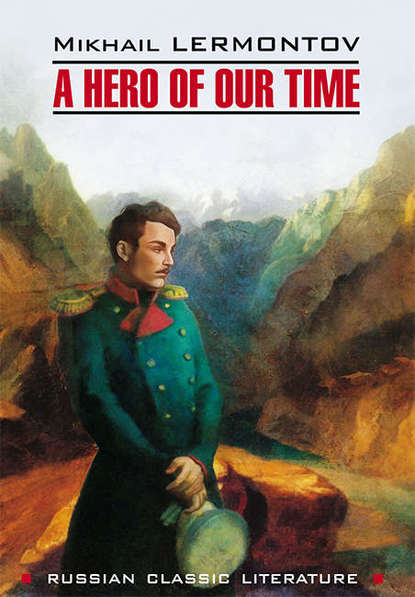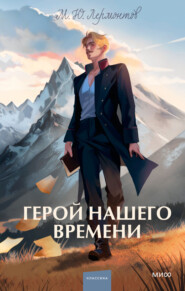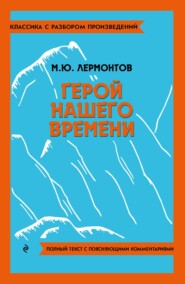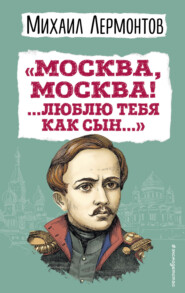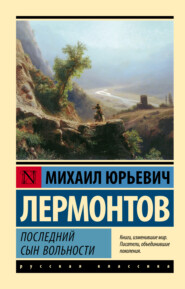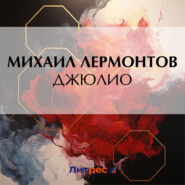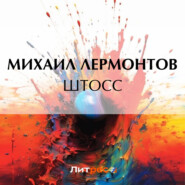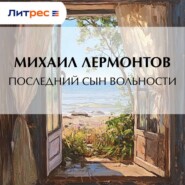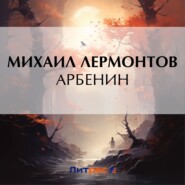По всем вопросам обращайтесь на: info@litportal.ru
(©) 2003-2024.
✖
A Hero of our time / Герой нашего времени. Книга для чтения на английском языке
Автор
Год написания книги
2019
Настройки чтения
Размер шрифта
Высота строк
Поля
“Were you long in the Chechen region?”
“Quite a while – ten years stationed at a fort with a company, out by the Stone Ford. You know the place?”
“Heard of it.”
“Yes, sir, we had enough of those gangs – now, thank God, things are quieter, but there was a time when you didn’t dare go out a hundred paces beyond the rampart without some hairy devil stalking you, ready to put a noose around your neck or a bullet through the back of your head the minute he caught you napping. But they were brave men anyway.”
“You must have had a whole lot of adventures?” I asked, with burning curiosity.
“Aye, many indeed…”
He began to pull at the left tip of his mustache, his head drooped, and he sank into deep thought. I very badly wanted to get some sort of tale out of him – a desire that is natural to anyone who travels about taking notes. In the meantime the tea came to the boil. I dug out two travelers’ glasses from my suitcase, poured out tea and placed one before the captain. He took a sip and muttered as if to himself: “Yes, many indeed!” The exclamation raised my hopes, for I knew that Caucasian old-timers like to talk and tell a story: they seldom have a chance to do so, for a man may be stationed a full five years with a company somewhere in the back woods without anyone to greet him with a “Hello” (his sergeant always says, “Good morning, sir.”) And there is so much to talk about: the wild, strange people all around, the constant dangers, and the remarkable adventures – one can’t help thinking it sad that we write down so little of it.
“Like to add a little rum?” I asked. “I have some white rum from Tiflis, it’ll warm you up in this cold.”
“No, thanks, I don’t drink.”
“How come?”
“Well… swore off the stuff. Once when I was still a second lieutenant we went on a brief spree, you know how it is, and that very night there was an alert. So we showed up before the ranks a little bit high, and there was hell to pay when old Yermolov found out. Lord preserve me from seeing a man as furious as he was. We escaped being court-martialed by a whisker. That’s the way it is: sometimes you spend a whole year without seeing anyone, and if you get drunk you’ve had it.”
On hearing this I nearly lost hope.
“Take even the Circassians,” he went on, “as soon as they drink their fill of booza at a wedding or a funeral the knife fight begins. Once i barely managed to escape alive although I was the guest of a neutral prince.”
“How did it happen?”
“Well,” he filled and lit his pipe, took a long pull on it, and began the story, “you see, I was stationed at the time at a fort beyond the Terek with a company – that was nearly five years back. Once in the fall a supply convoy came up, and with it an officer, a young man of about twenty-five. he reported to me in full dress uniform and announced that he had been ordered to join me at the fort. He was so slim and white, and so fashionably dressed up that I could tell at once that he was a newcomer to the Caucasus. ‘You must’ve been transferred here from Russia?’ I asked him. ‘Yes, sir,’ he replied. I took his hand and said: ‘Glad to have you here, very glad. It’ll be a bit dull for you… but we’ll get along real good, I’m sure, us two. Just call me Maksim Maksimich, if you like, and, another thing – please don’t bother wearing full dress uniform. Just come around in your service cap.’ he was shown his quarters and he settled down in the fort.”
“What was his name?” I asked Maksim Maksimich.
“Grigoriy Aleksandrovich Pechorin. A fine man he was, I assure you, though a bit odd. For instance, he would spend days on end hunting in rain or cold – everybody else would be chilled and exhausted, but not he. Yet sometimes a mere draft in his room would be enough for him to declare he had caught cold – a banging shutter might make him jump and turn pale, yet I myself saw him go at a wild boar single-handed. Sometimes you couldn’t get a word out of him for hours on end, but when he occasionally did start telling stories you’d split your sides laughing… Yes, sir, a most odd sort of young man he was, and, apparently, rich too, judging by the load of expensive trinkets he had.”
“How long was he with you?” I asked.
“Just about a year. But it was a year I won’t forget. He caused me plenty of trouble, God forgive him! – though that’s not what I remember about him. But after all, there are people who, when they are born, the big book of life has it already written down that all sorts of amazing things will happen to them!”
“Amazing things?” I exclaimed eagerly as I poured him some more tea.
“I’ll tell you the story. Some four miles from the fort there lives a loyal prince. His son, a boy of about fifteen, got into the habit of riding over to see us. Not a day passed that he didn’t come for one reason or another. Grigoriy Aleksandrovich and I really spoiled him. What a daredevil he was, good at everything: he could pick up a cap from the ground at full gallop, and he was a crack shot. But there was one bad thing about him: he had a terrible weakness for money. Once for a joke Pechorin promised him a gold coin if he stole the best goat from his father’s herd, and what do you think? The very next night he dragged the animal in by the horns. Sometimes, if we just tried teasing him, he would flare up and reach for his dagger. ‘You’ll come to a bad end, Azamat,’ I would tell him.
‘Yaman[1 - Bad!]. You won’t keep your skull on your shoulders!’
“Once the old prince himself came over to invite us to a wedding. He was giving away his elder daughter and since we were kunaks[2 - blood brothers] there was no way to say no, of course, Tatar or not. So we went. A pack of barking dogs met us in the village. On seeing us the women hid themselves – the faces we did catch a glimpse of were far from pretty. ‘I had a much better opinion of Circassian women,’ Grigoriy Aleksandrovich said to me. ‘You wait a while,’ I replied, smiling. I had something up my sleeve.
“There was quite a crowd assembled in the prince’s house. It’s the custom among those Asiatics, you know, to invite to their weddings everyone they happen to meet. We were welcomed with all the honors due to us and shown to the best room. Before going in, though, I took care to remember where they put our horses – just in case, you know.”
“How do they celebrate weddings?” I asked the captain.
“Oh, in the usual way. First the mullah reads them something from the Koran, then presents are given to the newlyweds and all their relatives. They eat, and drink booza, until finally the horsemanship display begins, and there is always some kind of filthy clown dressed in rags riding a mangy lame nag playing the fool to amuse the company.
Later, when it grows dark, what we would call a ball begins in the best room. Some miserable old man strums away on a three-stringed… can’t remember what they call it… something like our balalaika. The girls and young men line up in two rows facing each other, clap their hands and sing. Then one of the girls and a man step into the center and begin to chant verses to each other, improvising as they go, while the rest pick up the refrain. Pechorin and I occupied the place of honor, and as we sat there the host’s younger daughter, a girl of sixteen or so, came up to him and sang to him… what should I call it… a sort of compliment.”
“You don’t remember what she sang by any chance?”
“Yes, I think it went something like this: ‘Our young horsemen are strong and their caftan robes are encrusted with silver, but the young Russian officer is even stronger still and his epaulets are of gold. He is like a poplar among the others, yet he shall neither grow nor bloom in our orchard.’ Pechorin rose, bowed to her, pressing his hand to his forehead and heart, and asked me to reply to her. Knowing their language well I translated his reply.
“When she walked away I whispered to him: ‘Well, what do you think of her?’
“‘Exquisite,’ replied he. ‘What is her name?’ ‘Her name is Bela,’ i replied.
“And indeed, she was beautiful: tall, slim, and her eyes as black as a gazelle’s looked right into your soul. Pechorin grew thoughtful and did not take his eyes off her, and she frequently stole a glance at him. But Pechorin was not the only one who admired the pretty princess: from a corner of the room another pair of eyes, fixed and flaming, stared at her. I looked closer and recognized somebody I knew, Kazbich. He was a man you couldn’t say was loyal, though there was nothing to show he was hostile towards us. There were a good many suspicions but he had never been caught at any tricks. Occasionally he brought sheep to us at the fort and sold them cheap, but he never bargained: you had to pay him what he asked – he would never cut a price even if his life depended on it. It was said of him that he’d ride out beyond the Kuban River with the bandits, and to tell the truth, he did look like a guerrilla: he was short, wiry and broad-shouldered. And nimble he was, as clever as the devil! The embroidered shirt he wore was always torn and patched, but his weapons were ornamented with silver. As for his horse, it was famous in all Kabarda, and indeed, you couldn’t think of a better horse. The horsemen all around had very good reason to be jealous, and time and again they tried to steal the animal, but never could. I can still see the horse as if he were before me now: as black as tar, with legs like taut violin strings and eyes no less beautiful than Bela’s. He was a strong animal too, could gallop thirty miles at a stretch, and as for training, he would follow his master like a dog and always came when he called him. Kazbich never bothered to tie up the animal. A regular bandit horse!
“That evening Kazbich was gloomier than I had ever seen him, and I noticed that he had a coat of mail under his shirt. ‘there must be a reason for the armor,’ thought I. ‘He is evidently plotting something.’
“It was stuffy indoors, so I stepped out into the fresh air. The night was settling on the hills and the mist was beginning to weave in and out among the gorges.
“It occurred to me to look into the shelter where our horses stood and see whether they were being fed, and besides, caution never hurt anything. After all, I had a fine horse and a good many Kabardians had cast fond glances at him and said: ‘Yakshi tkhe, chek yakshi!’[3 - Good horse, excellent!]
“I was picking my way along the fence when suddenly I heard voices. One of the speakers I recognized right away: it was that good-for-nothing Azamat, our host’s son. The other spoke more slowly and quietly. ‘I wonder what they’re up to,’ thought I. ‘I hope it’s not about my horse.’ I dropped down behind the fence and cocked my ears, trying not to miss a word. It was impossible to hear everything, for now and then the singing and the hum of voices from the hut drowned out the conversation I was so interested to hear.
“‘That’s a fine horse you have,’ Azamat was saying. ‘Were I the master of my house and the owner of a herd of three hundred mares, I’d give half of them for your horse, Kazbich!’
“‘So it’s Kazbich,’ I thought and remembered the coat of mail.
“‘You’re right,’ Kazbich replied after a momentary silence, ‘you won’t find another like him in all Kabarda. Once, beyond the Terek it was, I rode with the guerrillas to pick up some Russian horses. We were unlucky though, and had to scatter. Four Cossacks came after me – I could already hear the infidels shouting behind me, and ahead of me was a thicket. I bent low in the saddle, trusted myself to Allah and for the first time in my life insulted the horse by striking him. Like a bird he flew between the branches, the thorns tore my clothes, and the dry elm twigs lashed my face. The horse leapt over tree stumps and crashed through the brush. It would have been better for me to slip off him in some glade and take cover in the woods on foot, but I couldn’t bear to part with him, so I held on, and the Prophet rewarded me. Some bullets whistled past overhead! I could hear the Cossacks, now dismounted, running along on my trail… Suddenly a deep gully opened up in front – my horse hesitated for a moment, and then jumped. But on the other side his hind legs slipped off the sheer edge and he was left holding on by the forelegs. I dropped the reins and slipped into the gully. This saved the horse, who managed to pull himself up. The Cossacks saw all this, but none of them came down into the ravine to look for me – they probably gave me up for dead. Then I heard them going after my horse. My heart bled as I crawled through the thick grass of the gully until I was out of the woods. Now I saw some Cossacks riding out from the thicket into the open and my Karagyoz galloping straight at them. With a shout they made a dash for him. They chased him for a long time. One of them almost got a lasso around his neck once or twice – I trembled, turned away and began praying. Looking up a few moments later I saw my Karagyoz flying free as the wind, his tail streaming while the infidels trailed far behind in the plain on their exhausted horses. I swear by Allah this is the truth, the truest truth! I sat in my gully until far into the night. And what do you think happened, Azamat? Suddenly through the darkness I heard a horse running along the edge of the gully, snorting, neighing and stamping his hoofs – I recognized the voice of my Karagyoz, for it was he, my comrade! Since then we have never separated.’
“You could hear the man patting the smooth neck of the horse and whispering to him all kinds of pet names.
“‘Had I a herd of a thousand mares,’ said Azamat, ‘I would give it to you for your Karagyoz.’
“‘Iok, No, I wouldn’t take it,’ replied Kazbich indifferently.
“‘Listen, Kazbich,’ Azamat coaxed him. ‘You are a good man and a brave warrior; my father fears the Russians and doesn’t let me go into the mountains. Give me your horse and I’ll do anything you want, I’ll steal for you my father’s best musket or sword, whatever you wish – and his saber is a real Gurda. Lay the blade against your hand and it will cut deep into the flesh. Mail like yours won’t stop it.’
“Kazbich was silent.
“‘When I first saw your horse,’ Azamat went on, ‘prancing under you, his nostrils open wide and sparks flying under his hoofs, something strange happened in my soul, and I lost interest in everything. I have nothing but contempt now for my father’s best horses, I’m ashamed to be seen riding them, and I have been sick at heart. In my misery I’ve spent days on end sitting on a hill, thinking of nothing but your fleet-footed Karagyoz with his proud stride and sleek back as straight as an arrow, his blazing eyes looking into mine as if he wanted to speak to me. I’ll die, Kazbich, if you will not sell him to me,’ said Azamat in a trembling voice.
“I thought I heard him sob; and I must tell you that Azamat was a most stubborn lad and even when he was younger nothing could ever make him cry.
“In reply to his tears I heard something like a laugh.
“‘Listen!’ said Azamat, his voice firm now. ‘You see I am ready to do anything. I could steal my sister for you if you want. How she can dance and sing! And her gold embroidery is something wonderful!
The Turkish Padishah himself never had a wife like her. If you want her, wait for me tomorrow night in the gorge where the stream flows. I’ll go by with her on the way to the next village – and she’ll be yours. Isn’t Bela worth your steed?’
“For a long, long time Kazbich was silent. At last instead of replying, he began softly singing an old song:
“Quite a while – ten years stationed at a fort with a company, out by the Stone Ford. You know the place?”
“Heard of it.”
“Yes, sir, we had enough of those gangs – now, thank God, things are quieter, but there was a time when you didn’t dare go out a hundred paces beyond the rampart without some hairy devil stalking you, ready to put a noose around your neck or a bullet through the back of your head the minute he caught you napping. But they were brave men anyway.”
“You must have had a whole lot of adventures?” I asked, with burning curiosity.
“Aye, many indeed…”
He began to pull at the left tip of his mustache, his head drooped, and he sank into deep thought. I very badly wanted to get some sort of tale out of him – a desire that is natural to anyone who travels about taking notes. In the meantime the tea came to the boil. I dug out two travelers’ glasses from my suitcase, poured out tea and placed one before the captain. He took a sip and muttered as if to himself: “Yes, many indeed!” The exclamation raised my hopes, for I knew that Caucasian old-timers like to talk and tell a story: they seldom have a chance to do so, for a man may be stationed a full five years with a company somewhere in the back woods without anyone to greet him with a “Hello” (his sergeant always says, “Good morning, sir.”) And there is so much to talk about: the wild, strange people all around, the constant dangers, and the remarkable adventures – one can’t help thinking it sad that we write down so little of it.
“Like to add a little rum?” I asked. “I have some white rum from Tiflis, it’ll warm you up in this cold.”
“No, thanks, I don’t drink.”
“How come?”
“Well… swore off the stuff. Once when I was still a second lieutenant we went on a brief spree, you know how it is, and that very night there was an alert. So we showed up before the ranks a little bit high, and there was hell to pay when old Yermolov found out. Lord preserve me from seeing a man as furious as he was. We escaped being court-martialed by a whisker. That’s the way it is: sometimes you spend a whole year without seeing anyone, and if you get drunk you’ve had it.”
On hearing this I nearly lost hope.
“Take even the Circassians,” he went on, “as soon as they drink their fill of booza at a wedding or a funeral the knife fight begins. Once i barely managed to escape alive although I was the guest of a neutral prince.”
“How did it happen?”
“Well,” he filled and lit his pipe, took a long pull on it, and began the story, “you see, I was stationed at the time at a fort beyond the Terek with a company – that was nearly five years back. Once in the fall a supply convoy came up, and with it an officer, a young man of about twenty-five. he reported to me in full dress uniform and announced that he had been ordered to join me at the fort. He was so slim and white, and so fashionably dressed up that I could tell at once that he was a newcomer to the Caucasus. ‘You must’ve been transferred here from Russia?’ I asked him. ‘Yes, sir,’ he replied. I took his hand and said: ‘Glad to have you here, very glad. It’ll be a bit dull for you… but we’ll get along real good, I’m sure, us two. Just call me Maksim Maksimich, if you like, and, another thing – please don’t bother wearing full dress uniform. Just come around in your service cap.’ he was shown his quarters and he settled down in the fort.”
“What was his name?” I asked Maksim Maksimich.
“Grigoriy Aleksandrovich Pechorin. A fine man he was, I assure you, though a bit odd. For instance, he would spend days on end hunting in rain or cold – everybody else would be chilled and exhausted, but not he. Yet sometimes a mere draft in his room would be enough for him to declare he had caught cold – a banging shutter might make him jump and turn pale, yet I myself saw him go at a wild boar single-handed. Sometimes you couldn’t get a word out of him for hours on end, but when he occasionally did start telling stories you’d split your sides laughing… Yes, sir, a most odd sort of young man he was, and, apparently, rich too, judging by the load of expensive trinkets he had.”
“How long was he with you?” I asked.
“Just about a year. But it was a year I won’t forget. He caused me plenty of trouble, God forgive him! – though that’s not what I remember about him. But after all, there are people who, when they are born, the big book of life has it already written down that all sorts of amazing things will happen to them!”
“Amazing things?” I exclaimed eagerly as I poured him some more tea.
“I’ll tell you the story. Some four miles from the fort there lives a loyal prince. His son, a boy of about fifteen, got into the habit of riding over to see us. Not a day passed that he didn’t come for one reason or another. Grigoriy Aleksandrovich and I really spoiled him. What a daredevil he was, good at everything: he could pick up a cap from the ground at full gallop, and he was a crack shot. But there was one bad thing about him: he had a terrible weakness for money. Once for a joke Pechorin promised him a gold coin if he stole the best goat from his father’s herd, and what do you think? The very next night he dragged the animal in by the horns. Sometimes, if we just tried teasing him, he would flare up and reach for his dagger. ‘You’ll come to a bad end, Azamat,’ I would tell him.
‘Yaman[1 - Bad!]. You won’t keep your skull on your shoulders!’
“Once the old prince himself came over to invite us to a wedding. He was giving away his elder daughter and since we were kunaks[2 - blood brothers] there was no way to say no, of course, Tatar or not. So we went. A pack of barking dogs met us in the village. On seeing us the women hid themselves – the faces we did catch a glimpse of were far from pretty. ‘I had a much better opinion of Circassian women,’ Grigoriy Aleksandrovich said to me. ‘You wait a while,’ I replied, smiling. I had something up my sleeve.
“There was quite a crowd assembled in the prince’s house. It’s the custom among those Asiatics, you know, to invite to their weddings everyone they happen to meet. We were welcomed with all the honors due to us and shown to the best room. Before going in, though, I took care to remember where they put our horses – just in case, you know.”
“How do they celebrate weddings?” I asked the captain.
“Oh, in the usual way. First the mullah reads them something from the Koran, then presents are given to the newlyweds and all their relatives. They eat, and drink booza, until finally the horsemanship display begins, and there is always some kind of filthy clown dressed in rags riding a mangy lame nag playing the fool to amuse the company.
Later, when it grows dark, what we would call a ball begins in the best room. Some miserable old man strums away on a three-stringed… can’t remember what they call it… something like our balalaika. The girls and young men line up in two rows facing each other, clap their hands and sing. Then one of the girls and a man step into the center and begin to chant verses to each other, improvising as they go, while the rest pick up the refrain. Pechorin and I occupied the place of honor, and as we sat there the host’s younger daughter, a girl of sixteen or so, came up to him and sang to him… what should I call it… a sort of compliment.”
“You don’t remember what she sang by any chance?”
“Yes, I think it went something like this: ‘Our young horsemen are strong and their caftan robes are encrusted with silver, but the young Russian officer is even stronger still and his epaulets are of gold. He is like a poplar among the others, yet he shall neither grow nor bloom in our orchard.’ Pechorin rose, bowed to her, pressing his hand to his forehead and heart, and asked me to reply to her. Knowing their language well I translated his reply.
“When she walked away I whispered to him: ‘Well, what do you think of her?’
“‘Exquisite,’ replied he. ‘What is her name?’ ‘Her name is Bela,’ i replied.
“And indeed, she was beautiful: tall, slim, and her eyes as black as a gazelle’s looked right into your soul. Pechorin grew thoughtful and did not take his eyes off her, and she frequently stole a glance at him. But Pechorin was not the only one who admired the pretty princess: from a corner of the room another pair of eyes, fixed and flaming, stared at her. I looked closer and recognized somebody I knew, Kazbich. He was a man you couldn’t say was loyal, though there was nothing to show he was hostile towards us. There were a good many suspicions but he had never been caught at any tricks. Occasionally he brought sheep to us at the fort and sold them cheap, but he never bargained: you had to pay him what he asked – he would never cut a price even if his life depended on it. It was said of him that he’d ride out beyond the Kuban River with the bandits, and to tell the truth, he did look like a guerrilla: he was short, wiry and broad-shouldered. And nimble he was, as clever as the devil! The embroidered shirt he wore was always torn and patched, but his weapons were ornamented with silver. As for his horse, it was famous in all Kabarda, and indeed, you couldn’t think of a better horse. The horsemen all around had very good reason to be jealous, and time and again they tried to steal the animal, but never could. I can still see the horse as if he were before me now: as black as tar, with legs like taut violin strings and eyes no less beautiful than Bela’s. He was a strong animal too, could gallop thirty miles at a stretch, and as for training, he would follow his master like a dog and always came when he called him. Kazbich never bothered to tie up the animal. A regular bandit horse!
“That evening Kazbich was gloomier than I had ever seen him, and I noticed that he had a coat of mail under his shirt. ‘there must be a reason for the armor,’ thought I. ‘He is evidently plotting something.’
“It was stuffy indoors, so I stepped out into the fresh air. The night was settling on the hills and the mist was beginning to weave in and out among the gorges.
“It occurred to me to look into the shelter where our horses stood and see whether they were being fed, and besides, caution never hurt anything. After all, I had a fine horse and a good many Kabardians had cast fond glances at him and said: ‘Yakshi tkhe, chek yakshi!’[3 - Good horse, excellent!]
“I was picking my way along the fence when suddenly I heard voices. One of the speakers I recognized right away: it was that good-for-nothing Azamat, our host’s son. The other spoke more slowly and quietly. ‘I wonder what they’re up to,’ thought I. ‘I hope it’s not about my horse.’ I dropped down behind the fence and cocked my ears, trying not to miss a word. It was impossible to hear everything, for now and then the singing and the hum of voices from the hut drowned out the conversation I was so interested to hear.
“‘That’s a fine horse you have,’ Azamat was saying. ‘Were I the master of my house and the owner of a herd of three hundred mares, I’d give half of them for your horse, Kazbich!’
“‘So it’s Kazbich,’ I thought and remembered the coat of mail.
“‘You’re right,’ Kazbich replied after a momentary silence, ‘you won’t find another like him in all Kabarda. Once, beyond the Terek it was, I rode with the guerrillas to pick up some Russian horses. We were unlucky though, and had to scatter. Four Cossacks came after me – I could already hear the infidels shouting behind me, and ahead of me was a thicket. I bent low in the saddle, trusted myself to Allah and for the first time in my life insulted the horse by striking him. Like a bird he flew between the branches, the thorns tore my clothes, and the dry elm twigs lashed my face. The horse leapt over tree stumps and crashed through the brush. It would have been better for me to slip off him in some glade and take cover in the woods on foot, but I couldn’t bear to part with him, so I held on, and the Prophet rewarded me. Some bullets whistled past overhead! I could hear the Cossacks, now dismounted, running along on my trail… Suddenly a deep gully opened up in front – my horse hesitated for a moment, and then jumped. But on the other side his hind legs slipped off the sheer edge and he was left holding on by the forelegs. I dropped the reins and slipped into the gully. This saved the horse, who managed to pull himself up. The Cossacks saw all this, but none of them came down into the ravine to look for me – they probably gave me up for dead. Then I heard them going after my horse. My heart bled as I crawled through the thick grass of the gully until I was out of the woods. Now I saw some Cossacks riding out from the thicket into the open and my Karagyoz galloping straight at them. With a shout they made a dash for him. They chased him for a long time. One of them almost got a lasso around his neck once or twice – I trembled, turned away and began praying. Looking up a few moments later I saw my Karagyoz flying free as the wind, his tail streaming while the infidels trailed far behind in the plain on their exhausted horses. I swear by Allah this is the truth, the truest truth! I sat in my gully until far into the night. And what do you think happened, Azamat? Suddenly through the darkness I heard a horse running along the edge of the gully, snorting, neighing and stamping his hoofs – I recognized the voice of my Karagyoz, for it was he, my comrade! Since then we have never separated.’
“You could hear the man patting the smooth neck of the horse and whispering to him all kinds of pet names.
“‘Had I a herd of a thousand mares,’ said Azamat, ‘I would give it to you for your Karagyoz.’
“‘Iok, No, I wouldn’t take it,’ replied Kazbich indifferently.
“‘Listen, Kazbich,’ Azamat coaxed him. ‘You are a good man and a brave warrior; my father fears the Russians and doesn’t let me go into the mountains. Give me your horse and I’ll do anything you want, I’ll steal for you my father’s best musket or sword, whatever you wish – and his saber is a real Gurda. Lay the blade against your hand and it will cut deep into the flesh. Mail like yours won’t stop it.’
“Kazbich was silent.
“‘When I first saw your horse,’ Azamat went on, ‘prancing under you, his nostrils open wide and sparks flying under his hoofs, something strange happened in my soul, and I lost interest in everything. I have nothing but contempt now for my father’s best horses, I’m ashamed to be seen riding them, and I have been sick at heart. In my misery I’ve spent days on end sitting on a hill, thinking of nothing but your fleet-footed Karagyoz with his proud stride and sleek back as straight as an arrow, his blazing eyes looking into mine as if he wanted to speak to me. I’ll die, Kazbich, if you will not sell him to me,’ said Azamat in a trembling voice.
“I thought I heard him sob; and I must tell you that Azamat was a most stubborn lad and even when he was younger nothing could ever make him cry.
“In reply to his tears I heard something like a laugh.
“‘Listen!’ said Azamat, his voice firm now. ‘You see I am ready to do anything. I could steal my sister for you if you want. How she can dance and sing! And her gold embroidery is something wonderful!
The Turkish Padishah himself never had a wife like her. If you want her, wait for me tomorrow night in the gorge where the stream flows. I’ll go by with her on the way to the next village – and she’ll be yours. Isn’t Bela worth your steed?’
“For a long, long time Kazbich was silent. At last instead of replying, he began softly singing an old song:





